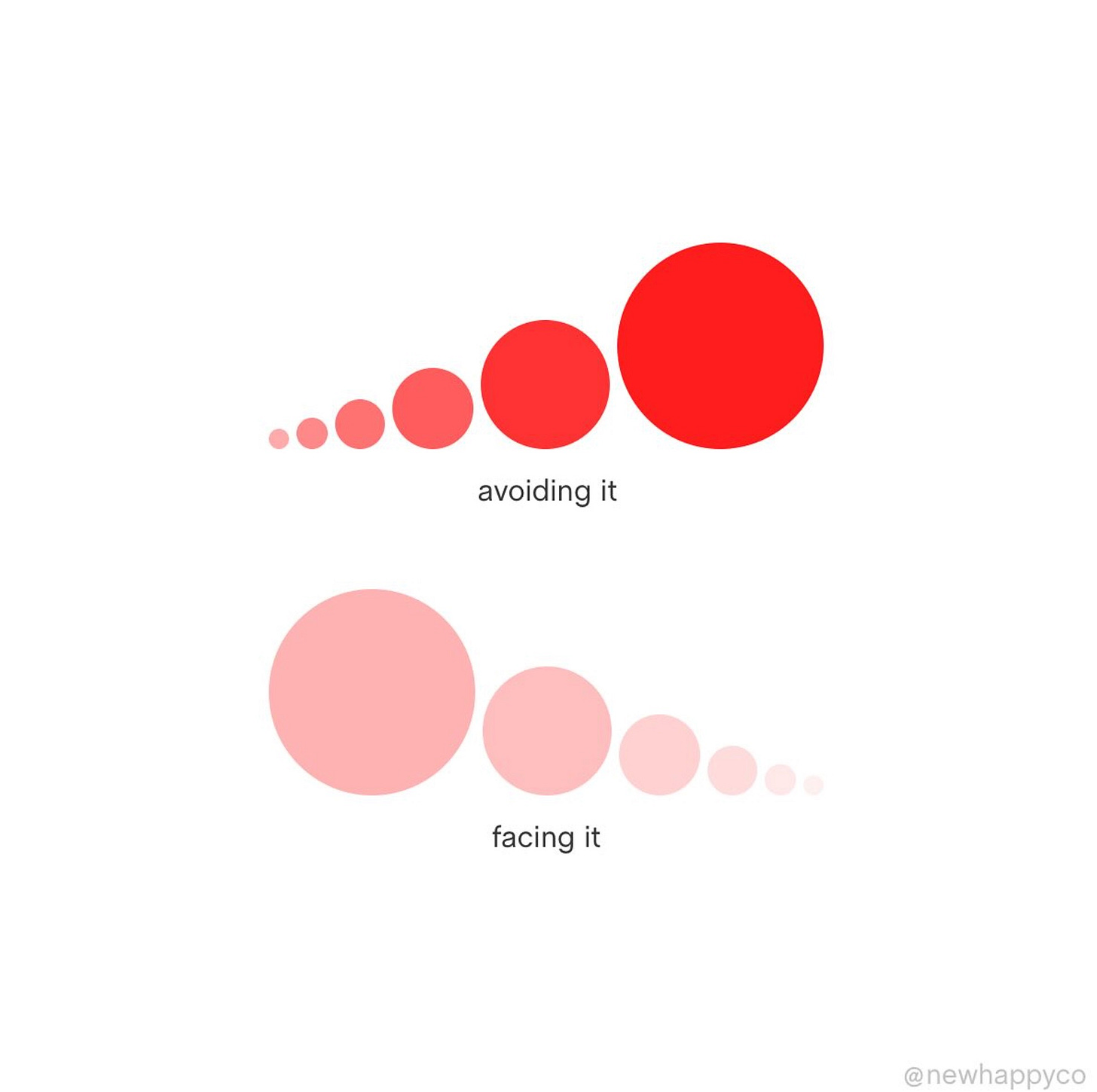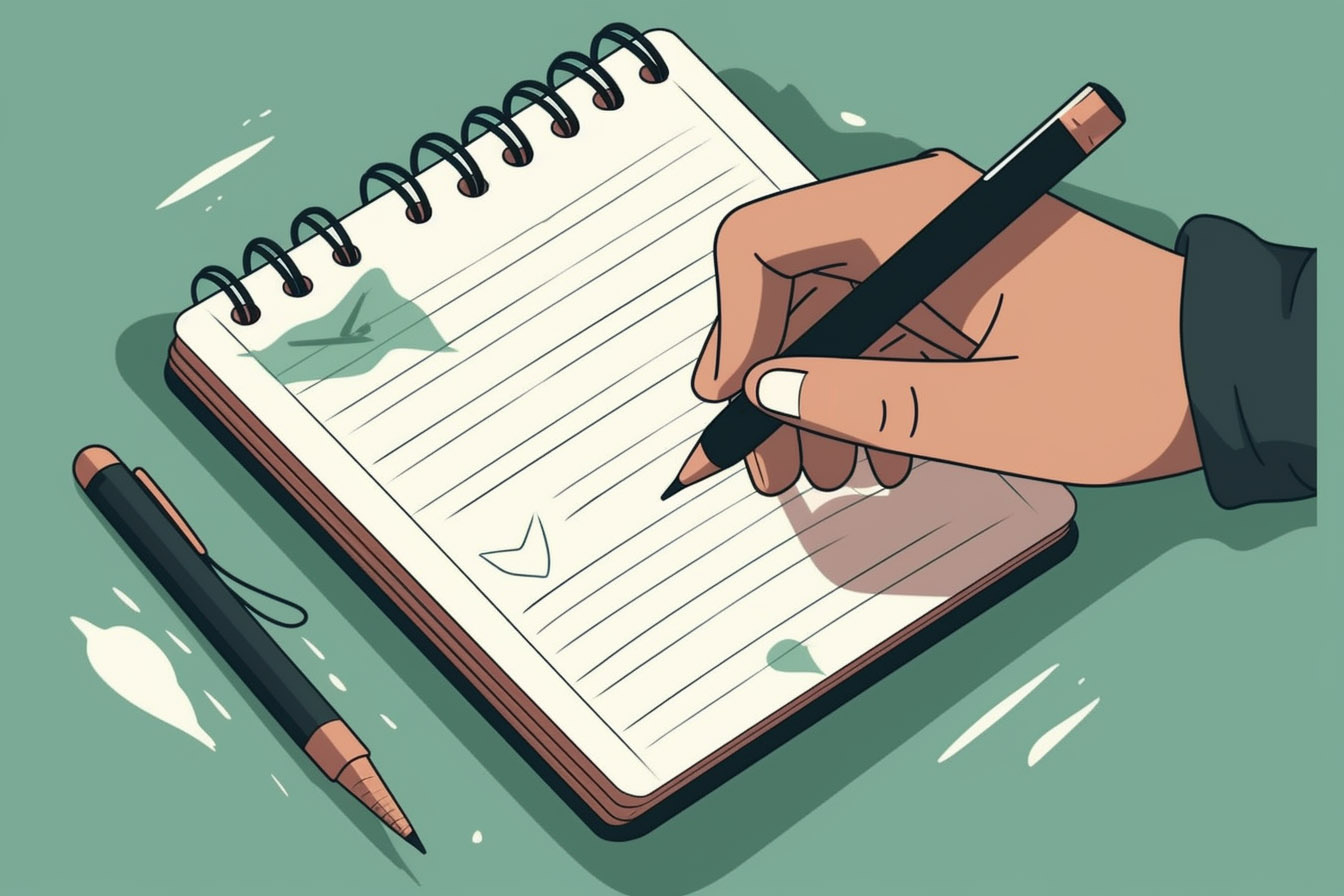A perfectionist's guide to stop procrastinating
Guess how long this was sitting in my drafts?
I have struggled with resting and real self care, using all my usual procrastination tricks, essentially to avoid doing what I needed to do. I wrote this post and was instantly annoyed because it felt too removed from me… like it was written by someone else. Out of body writing—is that a thing?
Instead of publishing it, I wrote about the frustrating experience here. Below is the freshly edited version of my original piece, and I’m much happier with it.
Procrastination comes in many forms: keeping yourself busy with unimportant tasks or creating new ones for avoidance, clogging up your time with research, endlessly scrolling social media, staring at the wall, cleaning, sleeping a lot…
A friend recently told me how procrastination helps him give ideas some time to percolate… to be more creative. This had me revisit my original thoughts on procrastination as always being a bad thing.
There are two (or more) sides to everything.
In this case, I’m talking about procrastination as a barrier to action—stalling, escaping, sidestepping, dodging.

Authors Linda Sapadin and Jack Maguire identified six types of procrastination and shared them in a book I’ve put it on my reading list with the promise to myself that I would NOT read it to avoid doing something else: It's About Time! The Six Styles of Procrastination and How to Overcome Them.
Here are the types:
Perfectionist - trying to make everything perfect, puts things off for fear of failure, waits to start until the “perfect” time
Dreamer - passive, pays little attention to detail, recoils from anything difficult, waits for things to fall in their lap
Worrier - indecisive and fails to commit, lacks confidence in abilities, prefers safety over risk
Defier - procrastinates in order to avoid feelings, is pessimistic, puts things off in anger or as a challenge to authority
Crisis-maker - easily bored and tried to ignore tasks until the last moment to purposefully increase stress, dramatizes situations and makes themselves the center of attention
Over-doer - overcommits to things, has trouble saying no, lacks self-discipline, cannot live up to impossible standards they create by overcommitments, has trouble relaxing
I’ve probably identified with each one at some point in my life, or a mixture. Overall, I think I’m mostly a Perfectionist with a side of Over-doer with a dash of Crisis-maker. Anyone who has ever worked with me will probably agree 🫣.
Rigid or procrastinating perfectionism can be a real impediment to innovation, team dynamic, leading an organization, company growth, and more.
I was again slipping into old perfectionist ways when I wanted created my Substack but felt it wasn’t good enough before sharing it with the world. Did I really want to share vulnerable things? Yes. Does Unsquare make any sense? No. Was my writing just plain awful? Kinda, but whatever. What if I’m all over the place? I am and always will be, amen. What if no one subscribes? I am writing first for myself and for others, second.
Creating a Substack account was easy because it wasn’t really “doing the work” of actually publishing and sharing. Once I got going, though, I had amassed a list of over 100 topics to write about and now, it’s pouring out of me and hasn’t stopped flowing.
How I battle my perfectionist “demon” brain 😈
As a perfectionist who procrastinates, you essentially need to find a forcing function—a way to jumpstart the engine. This could be to get to the first step of starting start something new (a business), or tackling a small task that can easily compound or have detrimental effects if not addressed (laundry or homework). For me, this looks like typing the first sentence on a fresh, white screen. Or, those first few scribbles on the canvas.
Start before your brain has time to talk you out of it1
Perfectionists often think, “it’s not the right time,” or “it’s not perfect yet” and sometimes “it’s just too much to deal with right now.” I mentioned in my first post that one of my favorite mantras is “start now” because there is no reason to wait until things are perfect because they will never be perfect. There is no ideal time to do hard or scary stuff, like start a business or career, or to hit send on that vulnerable Substack post… the perfect time doesn’t exist.
These are the times when we need to stop thinking and just do.2
The thinking is what can trap us in the loop of constant editing, overthinking, analysis paralysis, and “it could still be better”-ness.
“Start now” in action could look like getting out of bed and put on the workout clothes before your brain even has time to register what you’re doing. That way, you can pound the pavement sooner than your brain can try and talk you into sleeping in.
It can be posting an announcement on social media about your new business before bed, and then turning your phone notifications off and going to sleep.
Do whatever you can before your brain has a chance to overthink or talk you out of it. In time, your “what ifs” will start to slow their roll. The longer you wait, the harder it is to progress, and the more time your brain has to make excuses.
Create an end point and actually stop3
If you’re already in the midst of a project or goal, you have to find a natural stopping point. We can’t always allow a task to naturally progress and stop on its own; we must forcefully end it.
A definitive end can be anything from a time deadline (by Noon, by the end of the day) or a more fluid ending (when you are stuck), or a specific limit (1 hour, 500 words, 2 miles, etc).
Setting limits or deadlines before you even start on a project or begin your day can be helpful (the next few tactics are helpful in implementing limits). Give it your best effort in that amount of time you’ve allotted. I try not to let these deadlines become a source of stress. I created them, which means I can change them.
Chunk and batch it
One of the ways in which I’ve managed to make overwhelming tasks and projects palatable is to chunk them. Chunking is my new thing, and I advise everyone to try it. I learned this method from my daughter’s 5th grade teacher. It seems obvious, yet somehow I’d never considered it.
I was always a do-it-all-at-once-to-get-it-over-with kinda gal. In contrast, as a lifelong project manager, I’m quite the expert at breaking a big project down into tasks, assigning them, creating deadlines, and yet somehow haven’t been applying these skills to my own life “projects” until more recently.
I looked at many of my long-term goals and began breaking them down into manageable bites (like chocolate). It’s much easier to tackle a small task, and then take a break. Plus, as a member of box-checkers anonymous, I love crossing things off my to-do list! It’s also very satisfying to look back at your progress.
Similarly, a technique called batching breaks up your day into chunks. You can schedule specific tasks at certain times of day—early AM for productive tasks, late morning or afternoon for meetings and email, and late afternoon for future planning. This is especially awesome if you get easily distracted by emails or other notifications.
Another way you can batch (or chunk) is to have one day a week for related tasks. For example, you might be able to batch all your administrative duties into one day. Or, all of your doctor appts or errands. I typically don’t schedule meetings on Mondays because Monday tends to be overwhelming. I also chunk my fun meetings, tasks, and conversations for Fridays to help me wind down my week.
I find that this tactic is super helpful for me as an Over-doer, too. I can see how my schedule fills up each week and know whether I’m overloaded just by checking my calendar. I don’t always have to decide if I have time—I can let my calendar make the decision for me. And then I have one less thing to worry about.
Small task stacking
Another tip I got was from James Clear’s book, Atomic Habits. He says in order to get something done, you need to create a trigger, or a small habit. You can stack that habit with other things you already do. Stacking is designed for repetitive activities that can easily go together. This builds a stack in your brain and body similar to muscle memory. I don’t know the science… but it works!
For example, I have a pretty solid daily Duolingo streak going4, and I do it while drinking my coffee every morning. I also read most of my Substacks during that time. I listen to an audiobook or a podcast while taking my daily walk, which starts with the simple act of putting on my sneakers. Many years ago, I decided to take better care of my skin, so I created this habit stack: I get out of bed and immediately wash my face, and then apply eye cream, moisturizer, and sunscreen.
Yes, these are small potatoes, but they are important to me and now, they’ve become so habitual that it feels weird if I don’t do them.5 If we can break the hard things down into simple tasks and pair them with another enjoyable habit or task, they will be less painful.
Stacking is similar to chunking, but it’s less about measuring tasks and more about tiny actions you can do together. Don’t discount them, though, they are small but mighty. Over time, they will compound and you will see results.
Choose progress over perfection with accountability
Frankly, human beings are all progress and no perfection, despite what your ego wants to believe. So, embrace the process!
Essentially, create a way to be accountable and track your progress. If a to-do list is more demotivating or stressful for you, create a “done” list.
For me, this is making a daily checklist each morning. I also track my steps because I have a tendency to get super absorbed in things and forget to get up and move. I also have a chronic pain condition, so I also have a little spreadsheet to track all of my medications, symptoms, and treatments.
Of course, these don’t need to be daily goals… it’s more about making a commitment, like a weekly family dinner, or committing a day each month to volunteer. Maybe it’s a weekly meeting with a friend that you schedule and put on repeat. It could be having a buddy who is also doing the same thing alongside you, so you can share your progress and motivate one another.
I regularly schedule walks with friends so I can catch up with them while also getting exercise in (this is also stacking!). Doing this with a friend means I’m less likely to bail.
It’s crazy how we will show up more for others than for ourselves.
Automate it
The last ingredient of my chunked habit stack is “set it and forget it until you have to remember it.” I used to have a superb memory. I could remember all the important things without writing them down. As I’ve aged, though, my brain finally said “enough!” and started to filter out unnecessary junk to make room for only the most critical items.
There isn’t enough room in my clown car anymore to remember to take my morning vitamins.
The side effect of this is the need for constant reminders.
If I spend all of my brain power trying to remember little things on the daily, then I won’t have enough space for creative or deep thinking, which is what I prefer to spend my time doing. The simple act of turning those little things that I don’t need to think about again until the time comes gives me relief, and I can make room in my brain pantry for something more nutritious.
Whenever I’m on the move, I use Apple Reminders. This may seem obvious, but the Reminders app is pretty powerful, especially for repetitive tasks. If you’ve ever spent any extended amount of time with me, you have probably seen/heard me dictate. All of my reminders, notes, emails, and calendar events are delegated to Siri6 and she keeps track of them for me now. With new artificial intelligence-powered software and tools, I hope I’ll be able to automate even more.
Do the hardest thing first
Finally, I try and tackle the most challenging task of my day first. It’s that simple. I have to get it over with otherwise my brain will build it up into a paralyzing mountain.
There is no reward for overthinking, for procrastinating because of perfectionism, or avoidance. Like the saying goes: you miss 100% of the shots you don’t take, so don’t let you get in the way of your own progress or success.
The feeling of accomplishment never happens unless we hit the start button.
As I re-emerge from my existential procrastination spiral, I’m actually feeling much better because I have momentum. I can look back and thank myself for starting, even if I still find my writing to be “a work in progress”. I’m glad it’s finally out of my head. I have room for exciting, new things in there now. 🌸
Note to self: schedule this post when you’re done and move on. ✔️
Please do not apply this method to everything! It can be dangerous. I’m assuming here you‘ve spent some amount of time in the past thinking about whatever it is you’re jumping into. I’m all about impulsiveness, but with some knowledge of risk.
I gave myself a deadline of finishing this post by the end of the week. It’s now two months later. 😂 It happens.
889-day streak as of the writing of this post. 🔥
Seriously… my teeth feel weird if I don’t floss every night.
I recently changed Siri to an Australian accent. It makes me giggle.









